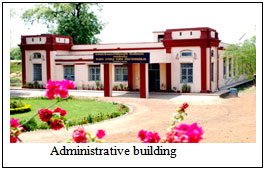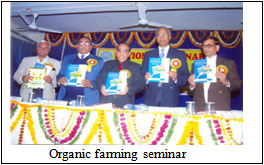![]()
Rajmata Vijayaraje Scindia Krishi Vishwa Vidyalya, Gwalior
 The RVSKVV, Gwalior was established by Government of Madhya Pradesh vide Ordinance No. 4 of 2008, notified in the Extraordinary Gazette No. 507, dated 19 August 2008, as second agricultural university by bifurcating JNKVV, Jabalpur. As per RVSKVV act (No. 4, 2009), its territorial jurisdiction is spread over 25 districts of Madhya Pradesh. The university represents well-knit action-oriented education, research and extension centres, operational in agriculture and allied field in the state. It comprises four Colleges of Agriculture, one College of Horticulture, and one College of Veterinary Science and Animal Husbandry having undergraduate, post-graduate and Ph.D. programmes. The research activities are operated through five Zonal Agricultural Research Stations (Morena, Khargone, Jhabua, Indore and Sehore) four Regional Agricultural Research Stations (Gwalior, Mandsaur, Ujjain and Khandwa) and four special research stations (Entkhedi, Bagwai, Jaora and Badwah), having 22 All India Coordinated Research Projects and several ad-hoc projects to improve the productivity and profitability of agricultural system. Transfer of technology is a part of extension activities carried out by 19 Krishi Vigyan Kendras.
The RVSKVV, Gwalior was established by Government of Madhya Pradesh vide Ordinance No. 4 of 2008, notified in the Extraordinary Gazette No. 507, dated 19 August 2008, as second agricultural university by bifurcating JNKVV, Jabalpur. As per RVSKVV act (No. 4, 2009), its territorial jurisdiction is spread over 25 districts of Madhya Pradesh. The university represents well-knit action-oriented education, research and extension centres, operational in agriculture and allied field in the state. It comprises four Colleges of Agriculture, one College of Horticulture, and one College of Veterinary Science and Animal Husbandry having undergraduate, post-graduate and Ph.D. programmes. The research activities are operated through five Zonal Agricultural Research Stations (Morena, Khargone, Jhabua, Indore and Sehore) four Regional Agricultural Research Stations (Gwalior, Mandsaur, Ujjain and Khandwa) and four special research stations (Entkhedi, Bagwai, Jaora and Badwah), having 22 All India Coordinated Research Projects and several ad-hoc projects to improve the productivity and profitability of agricultural system. Transfer of technology is a part of extension activities carried out by 19 Krishi Vigyan Kendras.
The overall climate varies from semi-arid to subhumid, with hot summer, cool and dry winter, and 600-1000 mm mean annual rainfall. The geographical area of the state under the jurisdiction of university contains three types of soils, varying from alluvial to medium and heavy black, spread over six agro climatic zones (Gird Zone, Malwa Plateau, Nimar Valley, Vindhya Plateau, Jhabua Hills and Bundelkhand Zone).
Mission
To conduct education, research and extension activities to improve the productivity, optimize the profit and sustainability of agricultural production system, and improve rural livelihood in Madhya Pradesh.
- Mandate
- To serve as a centre of higher education and research in the field of agriculture and allied sciences.
- To disseminate technology to farmers, extension personnel and organizations engaged in agricultural development through various extension programmes.
Organic farming for sustainable agriculture
A national seminar on Organic farming for sustainable agriculture and livelihood security was organized by RVSKAVV, Gwalior in collaboration with National Centre of Organic Farming, Ghaziabad, during 23-24 December 2009 at Gwalior. About 300 delegates from different parts of the country and 18 key speakers actively participated in it. The seminar was inaugurated by Prof. M. Kidwai, VC, Jiwaji University, Gwalior, whereas Prof. V. S. Tomar, VC, presided the inaugural function. Prof. Kidwai emphasized the role of organic farming in sustainability of agricultural system, minimizing the soil and water pollution and mitigating the adverse effects of global warming. A Souvenir containing messages of dignitaries, and the activity and achievements of different directorates of the university was also released by the chief guest. While delivering the presidential address, Prof. Tomar emphasized the fact that M. P. has potential to become the leading organic farming state in the country, and advocated the role of organic farming in moisture conservation, checking the degradation of land, improving the soil health, increasing the bio-diversity, reducing the soil, water and environmental pollution, and mitigating the emerging challenges of new era.
The themes of the seminar were (i) landmarks and perspectives in organic farming, (ii) organic resource management for sustainable agriculture, (iii) microbes and organic agriculture, (iv) organic standards for quality of produce, and (v) economic, social and policy aspects of organic farming for livelihood security.

In Valedictory function on 24 December 2009, Shri A. K. Shrivastav, Justice, M.P. High Court, Gwalior, the chief guest, called upon the farmers, scientists and students to work hard for improving the food security, which can be achieved only through sustainability in agricultural system. He advocated that research papers presented at the seminar will provide baseline and road-map for the development of agriculture. He also gave awards for the best posters. Dr D. N. Sharma, Director, Farmers’ Welfare and Agriculture Development, Government of Madhya Pradesh, and the special guest, assured that state is committed to the promotion of organic farming and formulate its policies. Prof. V. S. Tomar, VC, chaired the session.
- The following recommendations emerged from the deliberations at the seminar:
- To promote organic farming in Madhya Pradesh, there is a need to establish organic farmers societies; self-sufficiency in organic seed production at village level, and the development, standardization and notification of certification standards and technologies for value-added products etc.
- The programmes on vermin-compost and NADEP compost, production of bio-fertilizers and bio-pesticides as well as on green-manuring should be implemented under macro-management and National Food Security Mission.
- Research efforts should be made to develop efficient techniques to increase the nutritive value of various organic manures.
- Research-based modules of organic farming should be developed for different agro-climatic conditions of the state with financial support from NCOF, Ghaziabad.
- The infrastructure facilities for commercial production of bio-fertilizers and bio-pesticides, post-harvest management and marketing should be developed.
- Area-specific packages of practices for organic production of field crops, vegetables, fruit crops and spices should be developed and recommended for maximum production.
- Financial support should be given to agricultural universities for establishing quality-control laboratories and for location-specific research to develop packages of practices, techniques for post-harvest management and marketing of organics.
- The cost of certification should be subsidized by the state government.
- The area suitable for organic production should be identified and declared as organic production zones.
- Organic product should meet the requirements of importing countries and WTO norms. Accordingly, national and international certifying agencies should be encouraged to open certification centres in different parts of the country.
- Mechanism should be developed to provide information on export opportunities, guidance on international quality standards, trainings and marketing.
- Development and maintenance of livestock need to be strengthened.